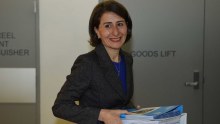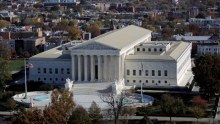Senate committee urged to ensure civil celebrants won't refuse services to same-sex couples
Updated
A Senate committee has been urged to ensure civil celebrants cannot refuse services to same-sex couples due to religious or conscientious objections.
Key points:
- Committee to consider changes to the Marriage Act
- In current form, legislation will extend an exemption for religious ministers, civil celebrants
- Religious institutions support exemption to civil celebrants
The committee will consider changes to the Marriage Act despite the Government's plebiscite bill being defeated and number of Coalition MPs remaining opposed to a direct vote in Parliament.
The inquiry — launched by Labor and the Greens — provides lawyers, religious and social service groups a chance to comment on draft legislation released by the Government in October.
In its current form, the legislation would extend an exemption for religious ministers to civil celebrants.
Law Council of Australia president Fiona McLeod said allowing civil celebrants to refuse to marry to same-sex couples would only further discrimination.
"There is no case to further entrench that protection in law or to extend that exemption to people who are performing secular services which is civil celebrants, or to allow religious organisations to discriminate when they're providing commercial services," she said.
In late 2015, Nationals senator Matt Canavan, Nationals MP David Gillespie and Liberal MP Michael Sukkar raised objections to an earlier version of the bill, claiming it would breach the rights of civil celebrants.
Ms McLeod said she was still hopeful the Government would change its position on same-sex marriage despite the defeat of the plebiscite.
"There's always hope and there's always hope when there's political will and there's political courage," she said.
"That's what we hope is obvious to members of parliament in both houses."
Marrying same-sex couples 'must be open'
In a submission, the Australian Federation of Civil Celebrants said it supported the exemption for civil celebrants but stressed it was not a unanimous decision.
The federation noted that same-sex marriage was "strongly supported" by a significant majority of its members and its national committee.
In a submission, the Australian Christian Lobby said civil celebrants should not be compelled to marry same-sex couples.
"Because freedom of conscience, thought and religion or belief is a right to be enjoyed by all individuals, it must be open to civil celebrants to not be compelled to solemnise any marriage but to conduct their work in accordance with their sincerely held conscientious or religious beliefs," it said in a submission.
The Australian Catholic Bishops Conference has also supported the exemption for civil celebrants.
But the Australian Human Rights Commission said marriage was not "inherently religious" and said allowing civil celebrants to deny services may not be consistent with human rights law.
As an alternative, the commission recommended a register of authorised celebrants that do not wish to marry same-sex couples due to conscientious or religious beliefs.
In a submission to the committee, the NSW Parliamentary Working Group on Marriage Equality said marriage celebrants were providing a government service.
"[We] believe that there ought not to be any discrimination by celebrants in civil marriages under the state, regardless of the celebrant's personal, moral or religious beliefs," the submission said.
The committee is due to report on February 13.
Topics: community-and-society, religion-and-beliefs, law-crime-and-justice, family-and-children, marriage, government-and-politics
First posted









